2005
SEASREP's 10th Anniversary Conference on Southeast Asia: A Global Crossroads
CHIANG MAI, THAILAND
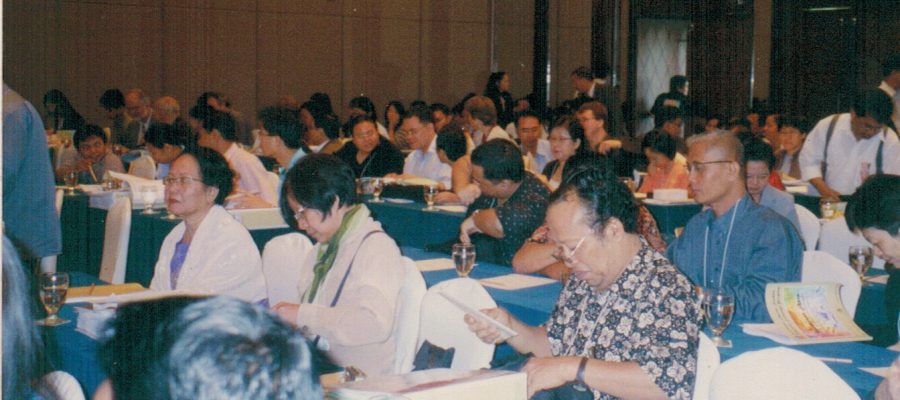
In celebration of the 10th year of SEASREP, the conference on Southeast Asia, A Global Crossroads took place in Imperial Mae Ping Hotel, Chiang Mai, Thailand on 8-9 December 2005. The conference objectives were:
- To showcase the achievements of SEASREP in its first ten years and launch its broader, more outward-looking vision for 2005-2014,
- To strengthen its network in the region and establish links with other scholars and institutions elsewhere, and
- To create a pool of papers from which an anthology could be published illustrating SEASREP’s vision of Southeast Asia as a global crossroads.
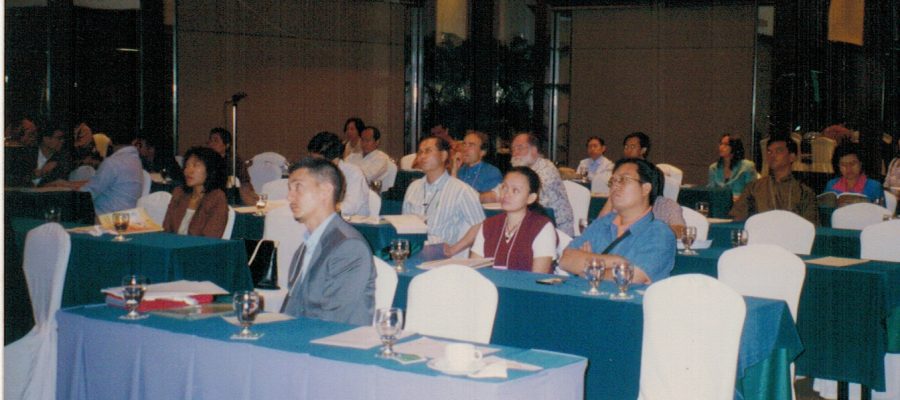
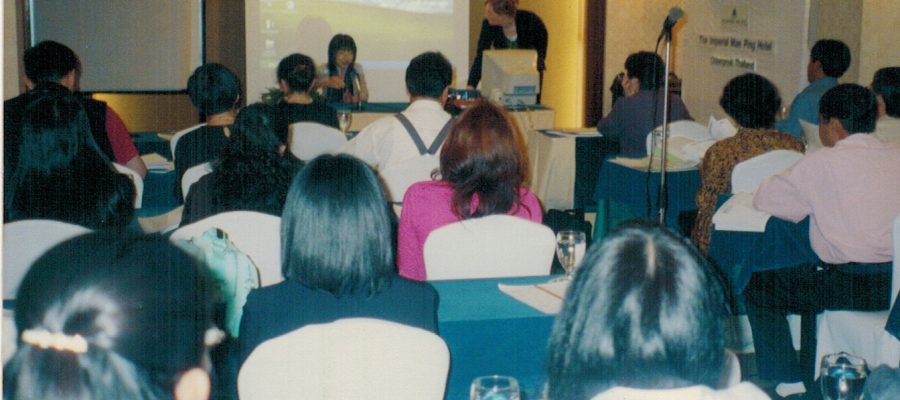
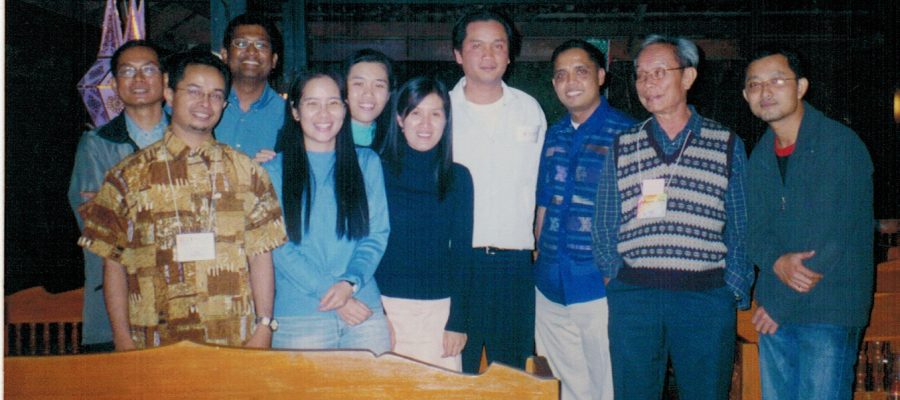
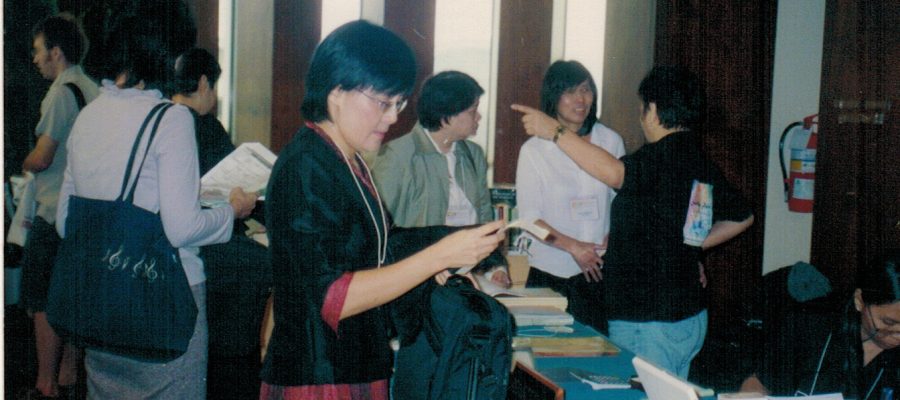
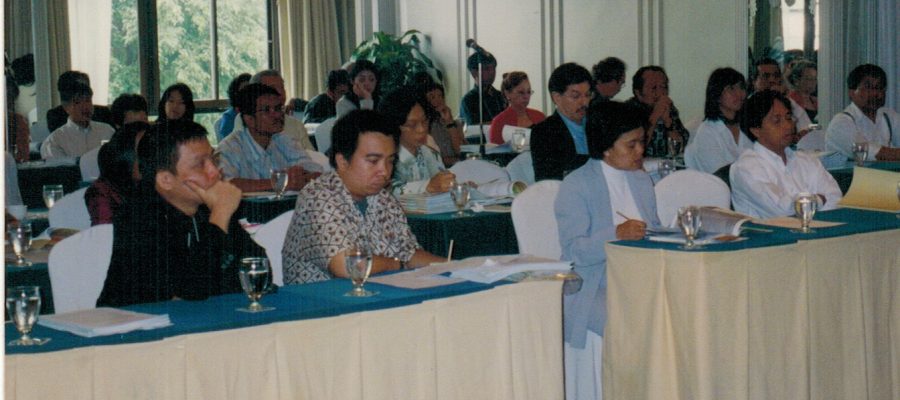
PANELS
The conference ran for two days and consisted of four to five simultaneous panels per day for a total of 33 panels. The topics of the conference papers varied and the panels were classified into two broad categories:
- Southeast Asia as an ancient and continuing global crossroads: early migrations, borders, ports, trade; and
- Southeast Asia as its own entity: cultures, ethnicity, nation-formation, economic development.
As for the composition of panels, there were three types:
- Panels comprised by SEASREP “alumni” of postgraduate study and regional collaboration grants;
- Panels organized by SEASREP affiliates, mostly former members of the Selection Committee, who were invited to conceptualize panel themes of their choice; and
- Open panels formed by interested Southeast Asianists from the region, and other parts of Asia.
Each panel consisted of three to five papers for a session of 1 hour and 45 minutes. The paper readers were asked to speak for about 15 to 20 minutes. Extra time was allotted to the open forum.
In all, 128 papers were presented. Two submitted papers but were not able to attend the conference for various reasons.
Panel 1: Origins, Early Migration, and Cultural Exchange in Pre-Historic Southeast Asia
- Stephen Chia Ming Soon, Universiti Sains Malaysia, Current Evidence of Prehistoric Trade, Cultural Exchange and Migration of People From Bukit Tengkorak, Semporna, Sabah and Other Sites in Southeast Asia and the Pacific
- Truman Simanjuntak, The National Research Center for Archaeology, Austronesians in Sulawesi: Its Origins, Diaspora and Living Traditions
- Victor Paz, Archaeological Studies Program, University of the Philippines – Diliman, Expanding the Research Horizon on the Neolithic of Island Southeast Asia.
- Thuy Chanthourn, Royal Academy of Cambodia, The Study of the Circular Earthwork or Banteay Kou in Southeast Asia
- Johan Arif, Institute of Technology Bandung, Contribution of Human Fossils from Indonesia for the Examination of Human History in Southeast Asia
Panel 2: History Writing, Oral Tradition, and Studies on Southeast Asian Intellectuals (A)
- Fakhriati, University of Indonesia, New Lights on the Life and Works of Teungku Di Pulo: An Achechnese Intellectual in the late 19th and 20th Centuries
- Thanet Aphornsuvan, Thammasat University, The Transformation of the Public Sphere in Modern Thai Discourse
- Maria Nela Florendo, University of the Philippines – Baguio, Locating Ethnicity in Southeast Asian Historiography
Panel 3: Trade from the 15th to 17th Centuries
- Roxanna Brown, Southeast Asian Ceramics Museum, Bangkok University, Zheng He and the Ceramics Trade in Southeast Asia
- Piyada Chonlaworn, Independent Researcher, Siam-Japan Munition Trade in the 16th and 17th Centuries
- Thanyarat Apiwong, Chiang Mai University, Jade and the Myanmar Economy in the Colonial Period, 1885-1948.
Panel 4: Port History
- Nazli bin Aziz, University of Malaya, Labuan, 1846-1963: From Natural Harbour to Planned Port
- Win Myat Aung, SEAMEO Regional Centre for History and Tradition, Trade and the Development of the Port of Penang
- Loh Wei Leng, University of Malaya, The Western Littoral of Southeast Asia: Tracing Regional Interactions in the Southwest Thailand and Northwest Malaysia Segment
Panel 5: Transborder Migration and Religion (A)
- Dave Lumenta, Kyoto University, Christ was an Illegal Migrant: Christian Proselytization in Upriver Sarawak (Malaysia)
- Mae Barros, University of the Philippines – Baguio, Ministers on the Move: Current Issues and Trends in Religion and Migration
- Nguyen Tran Lam, Amsterdam School for Social Science Research, University of Amsterdam, Transborder Migration and Religion: The Social Context of Religious Conversion Among the Hmong in Vietnam
- Judith Pine, University of Puget Sound, Lahu Baptist History: Protestantism, Modernity, and the Movement of People and Ideas
Panel 6: Visual and Performing Arts, Culture Change and Exchange
- Sittiporn Netniyom, Chiang Mai University, Decorative Glass Mosaic in Mandalay: A Study of the Cultural Relation and Change During the Late Konbaung and Colonial Period in Myanmar, 1857-1949
- Naruemol Teerawat, Chiang Mai University, A Historical and Socio-Cultural Study of Zinme and Luntaya Acheik Cloths: A Regional Cultural Exchange Across Time and Space
- Delfin Tolentino, Jr., University of the Philippines – Baguio, Ethnicity and the Issue of Representation in Cultural Forms
- Takako Iwasawa, National Museum of Ethnology, A Cultural Identity Constructed by a Southern Thai Performance Tradition
Panel 7: Consumption, Leisure and Space
- Nikos Lexis Dacanay, University of the Philippines – Diliman, The Politics of Performance in Bangkok’s Gay Saunas
- Elizabeth Morales-Nuncio, University of the Philippines – Diliman, Ethnicity, Consumption and Urban Space in Third and First World Settings in Southeast Asia: The Philippines and Singapore Experience
- Chae Suhong, Chonbuk National University, Ho Chi Minh City and the Political Economy of Reform
- Dewi Jayanti, University of Udayana – Bali, Pop Architecture and Consumption on Places of Uniqueness
- Lawrence Chua, Cornell University, A Chink in the Works: Building, Dwelling, and Translating the Penang Mansion of Zhang Bishi
Panel 8: New Media, Pop Cultures, In(Ter) Asia (A)
- David Hanan, Monash University, Languages and Social Formations in an Indonesian and a Thai Teen Movie
- Jane Vinculado, University of the Philippines – Diliman, Asia Invades the Philippines: Asian Soap Operas and Philippine Television Programming
- Amporn Jirattikorn, University of Texas at Austin, From Beyond Rangoon to Shan VCD: The Politics and Authenticity of Appropriation
- Rachmah Ida, Curtin University of Technology, Consuming Taiwanese (Boys) Culture: Watching Meteor Garden With Urban Kampung Women in Indonesia
Panel 9: Transnational Marriage and the State
- Allison Alexy, Yale University, Two Spouses, Two States: Considering Inter-Asian Divorce
- Shang-Luan Yan, Taipei City Government, A Better Life: Hidden Stories of Taiwanese-Southeast Asian Marriages
- Yean Ju-Lee, University of Hawaii, Increasing International Marriages in Korea: Comparisons Between Southeast Asian and East Asian Spouses
- Joseph Ryan Indon, Ateneo de Manila University, The Role of the State and Underlying Social Factors in Regulating Transnational Marriages in the Philippines
Panel 10: Traditions and Border Crossings:The Creation of Contemporary Performance in Southeast Asia (A)
- Julianti Parani, National Archives Singapore & Jakarta Institute of the Arts, Joget Dance: Southeast Asia Transborder Cultural Entertainment
- Jonas Baes, University of the Philippines – Diliman, When There is No More Music…or… Dumagat Internal Refugees in the Philippines and Issues of “Cultural Objecthood”
- Santosa Soewarlan, Sekolah Tinggi Seni Indonesia (STSI) Surakarta, Sandosa: Inovation in Javanese Wayang Kulit
- Tan Shzr Ee, School of Oriental and African Studies (SOAS), University of London, A Chinese Take(away) of Brahms: How the Singapore Chinese Orchestra Courted Europe
Panel 11: Transnational Migration and the Social Aspects of Remittances in Southeast Asia
- Md Mizanur Rahman, National University of Singapore, The Social Organization of Remittances: Remittance-Transfer from East and Southeast Asia to Bangladesh
- Linda Lumayag, Universiti Putra Malaysia, Social Remittance and Development: Some Empirical and Theoretical Observations from Indonesian Plantation Workers and Filipino Domestics in Malaysia
- Le Minh Thi, Hanoi School of Public Health, Changing Vietnamese Rural Family’s Structure in the Duration of Renovation: Illustrations of the Aspects of Remittances from Labor Exported Women to Taiwan and Malaysia
- Leslie Advincula-Lopez, Ateneo de Manila University, OFW Remittances, Social Capital and Inequality in the Philippines
- Brenda Tiu Tenegra, Ochanomizu University, The Community Dimension and Social Aspects of ‘Katas ng Japan’: Stories from Filipina Domestic Workers in Tokyo
Panel 12: Reconstruction of Political Structures and Institutions
- Ngun Cung Lian, Indiana University School of Law – Bloomington, Federalism, Constitution Making and State Building in the Union of Burma (Myanmar)
- Lugina Setyawati, University of Indonesia, Regional Ethnic Identity and the Unity of Indonesia
- B.M. Jain, University of Rajasthan, Dynamics of Political Transition in Myanmar: Impediments and Alternative Futures
- Lew Seok-Choon, Yonsei University & Kim Juyeon, University of Chicago, Applying the New Institutional Perspective to Political Change of Authoritarian Regimes in the 1980s: South Korea and Singapore
- Eugene Tan, Singapore Management University & Tina Kempin, University of Pennsylvania, National Self-Determination and Federalism in Southeast Asia: Disjuncture Between Law and Policy?
Panel 13: Art as Medium of Political Expression
- Patrick Flores, University of the Philippines – Diliman, Colonial Posterities: Portraiture and the Face of the Modern.
- Dakila Fernando, University of the Philippines – Diliman, Militarism and Authoritarian Rule: Visualizing Desire for Social and Political Change in the Philippines and Indonesia through the Comics of Nonoy Marcelo and Sapto Rahario (Athonk)
- Jane Ferguson, Cornell University, Sublime Rock: Burmese Popular Music, Language Code Switching and Sentimentalism Among Shan Migrants at the Thai-Burma Border
Panel 14: Women in the Nation, in Society, and at Work
- Pinkaew Laungaramsri, Chiang Mai University, Women, Nation, and the Ambivalence of Subversive Identifications Among Shan Women in Thailand and Myanmar
- Tri Marhaeni Astuti, Lembaga Penelitian UNNES Semarang, Redefining Women: The Case of Female Migrant Workers from Godong, Grobogan, Central Java
- Myrthena Fianza, Mindanao State University, Resource Access and Tenure, Indigenous Women’s Relations to Land and Production, and Political Mobilization: Some Observations on the Ibaloy Igorot of the Northern Philippine Highlands and the Moros of Muslim Mindanao
- Cahyaningrum Dewajati, Gadjah Mada University, Eroticism and Religiosity: Mainstream Phenomena in Women’s Writing of Contemporary Indonesian Literature
- Marieta Sumagaysay, University of the Philippines in the Visayas – Tacloban College, From Fields to Coasts: Determinants of Women’s Work
Panel 15: Education and Change
- Ellen Huang Palanca, Ateneo de Manila University, Chinese Education in the Philippines and Malaysia: A Comparative Study
- Urai Endang Kusumajaya, Pontianak State Polytechnic, Social Transformation Through Popular Education
- Suparto, Monash University, Translating Modernity: Remaking Pesantren Buntet
Panel 16: History Writing, Oral Tradition, and Studies on Southeast Asian Intellectuals (B)
- Hussain Othman, Tun Hussein Onn University College of Technology (Malaysia), The Characteristics of the Malay Historiography.
- Ivie Carbon Esteban, Universiti Kebangsaan Malaysia, Some Problems on Methodology: The Variants of Sja’ir Perang Mengkasar
- Dedy Ari Asfar, Balai Bahasa Kalimantan Barat, Islamic and Pre-Islamic Culture: The Data of Malay Oral Literature in Cupang Gading, West Kalimantan
Panel 17: Language Choice and Identity
- Chong Shin, Universiti Kebangsaan Malaysia, Language Choice in a Multilingual Society: The Chinese Minority of Sekadau (Indonesia)
- Yusriadi, Universiti Kebangsaan Malaysia, Language and Identity: A Comparison of Riam Panjang (Indonesia) and Sepauh (Sarawak)
- Karim Harun, Universiti Kebangsaan Malaysia, History of Malay in the 17th Century: Malay Grammar in the 17th Century
- Sophana Srichampa, Mahidol University, Dynamics of Identity: The Transition of Polite Expressions in the Vietnamese Language Spoken in Vietnam
- James Collins, Universiti Kebangsaan Malaysia, The Praxis of Language Choice Among Benawas Speakers in Kalimantan Barat, Indonesia
Panel 18: Borders in History
- Pamaree Surakiat, Chulalongkorn University, The Changing Nature of Conflict Between Burma and Siam at the Time of Growth and Development of Burmese States, 16th–19th Century
- Rolando Esteban, University of the Philippines – Los Baños, The Illanuns: Inquiries into Diaspora, History, and the Birth of Ethnicity
- Mala Rajo Sathian, University of Malaya, From Heartland to Borderland: The Economy of Pattani and the Thai State (c. late 19th – early 20th century)
- Xiuli Wang, Ritsumeikan Asia Pacific University, Kokang in the Myanmar-China Borderland
- I Ketut Ardhana, Research Center for Regional Resources (PSDR-LIPI), Sharing the Burden Among Marginalized People in the Border Areas of East Kalimatan-Indonesia and Sarawak-Malaysia
Panel 19: Divinity, Rituals and Beliefs (A)
- Kwanchewan Buadaeng, Chiang Mai University, Religious Cults Among the Karens in Myanmar and Thailand
- Julia Cassaniti, University of Chicago, Psychological Anthropology of Religion in Northern Thailand
- Judith Balares-Salamat, Camarines Sur State Agricultural College, Lola as Bicol Babaylan
- Taweesak Woraritruengaurai, Thammasat University, Undertakers in the Mon Community: Lives and Identities
Panel 20: Minority in Politics
- Priscilla Koh Siew Im, National University of Singapore, Vietnamese Ethnology in the Doi Moi Period, 1986–2001
- Suria Saniwa bin Wan Mahmood, Universiti Kebangsaan Malaysia, Democracy and Minorities: A Comparative Study of the Malay-Muslims in Southern Thailand and Thai Buddhists in Northern Malaysia, 1990-2005
- Budi Agustono, University of North Sumatera, Reconstructing Ethnic Identity: A Case of Pakpak in Dairi Regency, North Sumatera, Indonesia
- Yekti Maunati, The Indonesian Institute of Sciences (PSDRLIPI), Regional Autonomy in the Eyes of Indigenous People: The Case of the Dayak in East Kalimantan-Indonesia
Panel 21: Divinity, Rituals and Beliefs (B)
- Silapakit Teekantikun, Vietnam National University, Goddess of Four Palaces Cult: A Ritual Space of Vietnamese Women
- Watana Moonkham, Chiang Mai University, Mahayana Buddhist Concepts in Northern Thai Folk Beliefs and Rites: Implication for Archaeology
- Ang Choulean, Royal University of Fine Arts, Fusion with the Divine
- Hermansyah, Universiti Kebangsaan Malaysia, Magic and Power: Beliefs and Mantra Among the Upriver Malays of Kalimantan Barat, Indonesia
- Choi Horim, Chonnam National University, Cultural Politics of Religion and Ritual in Vietnam
Panel 22: Land, Farming and the Transformation of Agricultural Communities
- Yunita Winarto, University of Indonesia, Examining Evolutionary Changes in a Comparative Perspective: The Cambodian and Thai Cases of Rice Farming Culture
- Yonariza, Andalas University, Southeast Asia Land and Resource Tenure Revisited: Indonesia, Philippines, and Thailand
- Sharon Singzon, Asian Institute of Technology & Ganesh Shivakoti, Asian Institute of Technology, Family Changes and the Transformation of an Agricultural Community in Tambon Pong Talong, Lamphra Phloeng Watershed, Thailand
- Jude William Genilo, Advocates for Community-Based Communication and Development, Community-Based Communication and Technology Transfer in Philippine and Thai Rice Farming Villages
Panel 23: Dynamics of Ethnic Relations
- Phumphat Chetiyanonth, Thammasat University,Th e Shan of Yawnghwe: The Story of Inter-Ethnic Relationship Among the Ethnic Groups in Nyaungshwe-Inle
- Pichet Saiphan, Vietnam National University, Moving Cultural Identities Between the Montagnards and the Vietnamese People in Dien Bien Phu
- Anavic Bagamaspad, University of the Philippines – Baguio, Negotiating Ethnic Identities Among Descendants of Cantonese Chinese and Ibaloys in the Uplands of Northern Luzon
- Albertus Yustinus Imas, Institut Dayakologi & Kalimantan Review Bulletin, The Dichotomies of Dayak and Melayu in West Kalimantan: Blessing in Disguise or Hidden Calamity
Panel 24: Traditions and Border Crossings: The Creation of Contemporary Performance in Southeast Asia (B)
- Zulkifli Mohamad, Svarnabhumi (SVB) Studio and Axia Productions (Kuala Lumpur), West End + Broadway + Bangsawan = Malaysian Musical
- Helly Minarti, Roehampton University (United Kingdom), Si Ganjuo Lalai in ‘Fire in the Husk’: Imagery of Minangkabau Female Dancing Body
- Flaudette May Datuin, University of the Philippines – Diliman, Reclaiming the Healing Arts of the Ancient Priestess: Babaylanism as Site of Southeast
- Asian ‘Feminisms’
- Matthew Santamaria, University of the Philippines – Diliman, Lam-ang: A Study of the Theme of Grief in Three Texts and Appropriation in a Philippine Context
Panel 25: Fish Fights over Fish Rights: Conflicts and Conflict Resolution in the Fisheries in Southeast Asia
- Nerissa Salayo, The WorldFish Center, Malaysia, Fish Fights over Fish Rights: Conflicts and Conflict Resolution in Fisheries in Southeast Asia
- Ida Siason, University of the Philippines in the Visayas, Fish Fights over Fish Rights: Conflicts Over Use of Municipal Waters in the Visayan Sea in the Philippines and Prospects for Resolution
- Keang Seng, Inland Fisheries Research and Development Institute, Fish Fights over Fish Rights: Conflicts Arising from Re-allocation of Fishing Lots in Cambodia
- Masae Awae, Coastal Resources Institute, Prince of Songkhla University, Fish Fights over Fish Rights: Conflicts and Suggested Mitigating Measures for Anchovy and Small-scale Fisheries in Songkhla, Thailand
Panel 26: Transborder Migration and Religion (B)
- John Haba, Indonesian Institute of Sciences (PMB-LIPI), The Role of the Catholic Church in Tawau Among the Migrants from Flores Peoples, East Nusa Tenggara Timur, Indonesia
- Catharina Williams, Australian National University, Religion as a Social Infrastructure in Transnational Migration of Eastern Indonesian Domestic Workers
- Thongrith Phoumirath, Australian National University, Old Refuge in a New Land: Transnational Religion and the Changing Face of a Lao Wat
- Sharon Cheuk, Universiti Malaysia Sabah, The Role of the Church as an Intermediary in Transborder Migration of Chinese- Hakka Christians to Sabah, Malaysia from 1881 to 1946
Panel 27: Islamic Identity and Autonomy
- Ubed Abdilah S., Center for Religious and Cross-Cultural Studies, Gadjah Mada University, Construction of Identity of Chinese Moslem in Indonesia and Malaysia
- Ruth Mapanao, University of Southern Mindanao, Former Moro National Liberation Front’s (MNLF) Combatants: Mindanao’s Fighters Turned Farmers
- Muhammad Wildan, Universiti Kebangsaan Malaysia, Islamic Fundamentalism and Modernization: The Case of the Jamaah Islamiyah (JI) in Indonesia
- Khin Maung Yin, International Islamic University Malaysia, Excluding the Included: Bamar (Burman) Muslims’ Quest for Bamar-but-Islamic Identity in Burma
Panel 28: Regionalization in Southeast Asia: Issues and Prospects
- Sergio Adrian Feld, UNDP Regional Centre in Bangkok, Mekong Community Dialogues: How to Build Cross-Border Environmental Governance
- Withaya Sucharithanarugse, Chulalongkorn University, Southeast Asian Dynamism After the End of Cold War
- Rujhan Mustafa, Universiti Malaysia Sarawak & Ministry of Higher Education Malaysia, From East Asian Economic Caucus to East Asian Community
- Daniel Novotny, University of New South Wales, Southeast Asia: Towards the Zone of Benign Images
- Hasrul Sani Siregar, Riau University, The Basis of SIJORI (Singapore-Johor-Riau) Cooperation: A Study of the Participation of Riau
Panel 29: Discourse, Related Concepts on Nation-State
- Dolly Kikon, Jawaharlal Nehru University, Living Between South and Southeast Asia: Mapping the Politics of the Naga Transnational Struggle
- Rattanaporn Poungpattana, Chulalongkorn University, Buddhism and the Reconstruction of the Strong State in Myanmar, 1988- 2003
- Sirote Klampaiboon, University of Hawaii at Manoa, Cyber Separatism, Global Transgression, and the Reconstruction of Nation-State: The Experience from South Thailand
- Kim Ye-Kyoum, Asia United Theological University, Are Southeast Asian Societies Progressing?
- Miriam Coronel Ferrer, University of the Philippines – Diliman, Ethnopolitical Mobilizations in the Cordillera and Muslim Mindanao: A Comparison of Two Resistance Narratives
Panel 30: Youthful Politics and the Politics of Youth
- Al Chaidar, Universitas Malikussaleh, Fight for Freedom or Fight for Democracy? The History of Acehnese Student and Youth Movements
- Ko Ko Thett, University of Helsinki, Burmese Student Politics and Studentism
- Francis Gealogo, Ateneo de Manila University, The First Quarter Storm and Student Radicalism in the Philippines: Historical Roots and Political Trajectories
- Mohd. Faizal bin Musa, Penerbitan Se-lain, Looking at Islamic Student Movement in Malaysia: Historical Roots, Current Struggles and Future Challenges
- Onanong Thippimol, Walailak University, The Role of Student Movement and the Fall of Suharto
Panel 31: Borders, Migration and Community Formation
- Aranya Siriphon, Chiang Mai University, Cultural Border, Contested Landscape and Hierarchies of Power: Sinicized Tai Migrant Workers Along the Burma-Yunnan Frontier in the Labor Trade Context
- Masaru Fujii, Kobe University & Preecha Kuwinpant, Chulalongkorn University, Trans-Border Migration and Local Community in Thailand: The Case of Migrant Workers from Myanmar, Laos, and Cambodia in Chonburi – (Part 1) Overview, and Social Life of Migrant Workers
- Atsushi Kitahara, Kobe University, Trans-Border Migration and Local Community in Thailand: The Case of Migrant Workers from Myanmar, Laos, and Cambodia in Chonburi – (Part 2) Migration Processes and Working Conditions of Migrant Workers
- Liulan Wang, Kyoto University, Migratory History and Network Building of the Yunnanese Muslim on the Thai- Myanmar Border
- Lee Sang Kook, National University of Singapore, Beyond a plural Society: The Market, Social Fields, and Interactions in a Border Town in the Thailand-Burma Borderland
Panel 32: New Media, Pop Cultures, In(Ter) Asia (B)
- Jacqueline Siapno, Universidade de Paz, Tracing Circuits of Power, Identity, and Resistance: The Impact of the Ideologies of New Media, Nationalism, Globalization, and Democracy on the Body, Social Bodies, and Body Politics in East Timor and the Philippines
- John Langer, Victoria University, The Audience in Action: Making Sense of Thai Television Advertising
- Vissia Yulianto, Universitas Sanata Dharma, Women and the Boom of Infotainment in Indonesia: A Re-domestification of Women
- Eloisa May Hernandez, University of the Philippines – Diliman, Korean Ragnarok and Its Impact on Philippine Contemporary Culture
Panel 33: Globalization And Resistance
- Prasit Leepreecha, Chiang Mai University, Hmong in Southeast Asia at the Crossroads
- Oetami Dewi, University of Indonesia, Resistance of Indigenous People (Plasma Farmer) in an Oil-Palm Plantation in West Kalimantan
- Hj. Ahmad Fauzi Hj. Morad, Universiti Putra Malaysia, Challenges of Globalization: Responses from the Indigenous Peoples of East Malaysia
- Carlos Tatel, Jr., University of the Philippines – Diliman, Globalization and Weaving: Negotiating Global Trends and Local Traditions in the Indigenous Textile Production of Island Southeast Asia
- Diana Mendoza, Ateneo de Manila University, Women, Globalization and Resistance

